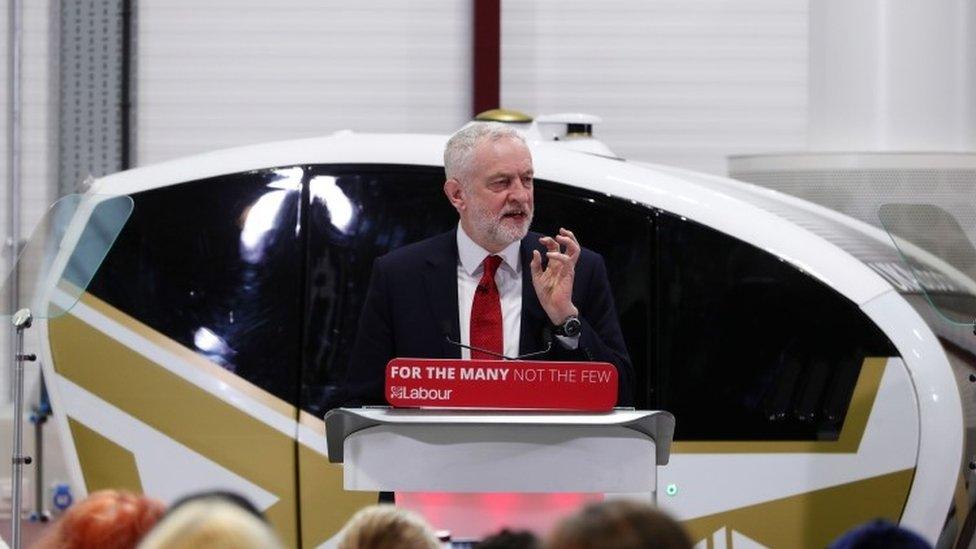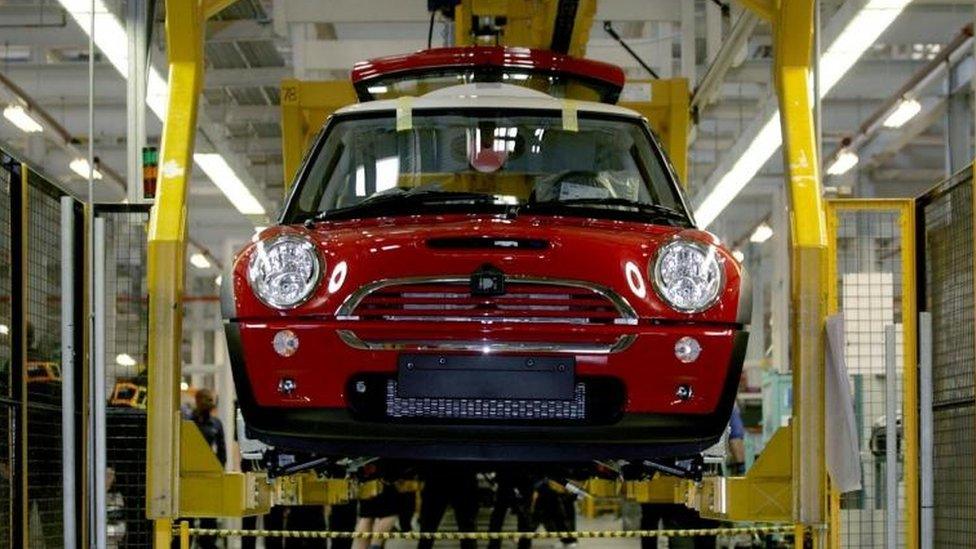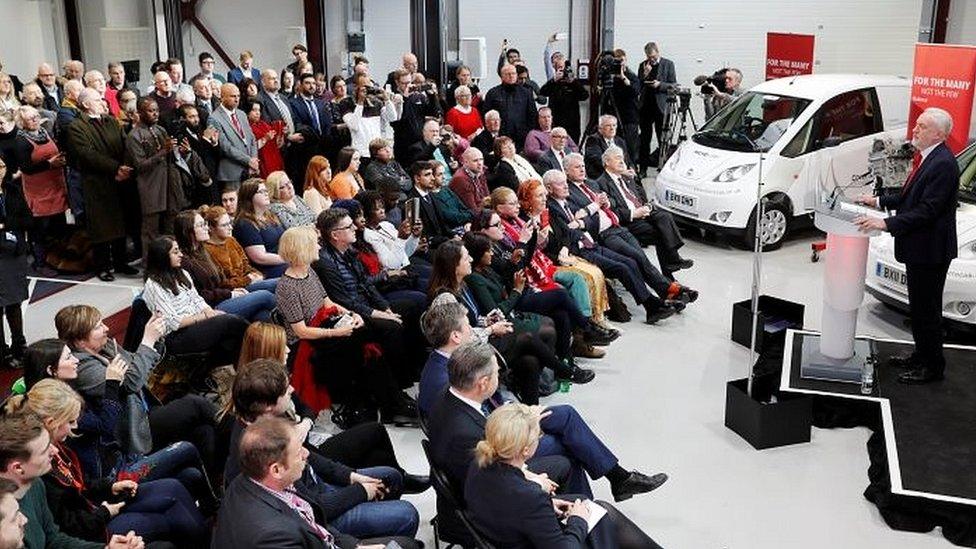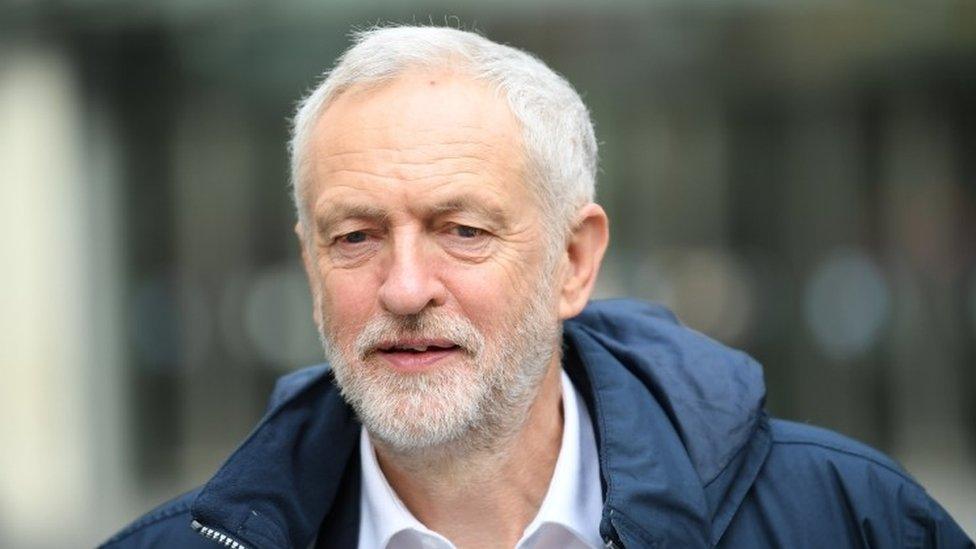Jeremy Corbyn drives towards customs union in Coventry
- Published
Labour's drive on Brexit

The Labour leader delivered his Brexit speech at Coventry University
On the face of it, his message could not have been clearer.
The gleaming 'next generation' cars in Coventry University's ultra high-tech National Transport Design Centre placed Jeremy Corbyn right at the centre of Britain's rejuvenated motor industry.
Fears it could lose its open access to lucrative European car markets post-Brexit has sent its leaders into a wheel spin, especially now Theresa May has ruled out Britain remaining in the Single Market, or in either 'the', or 'a' customs union.
Mr Corbyn, by contrast, was here to tell us a Labour government "would seek to negotiate a new comprehensive UK-EU customs union".
This distinct softening of Labour's line on Brexit might also put Mrs May on collision course with those Remain-supporting Tory backbenchers who warn they are prepared "to put country before party" even if it means siding with Labour on a crucial trade motion, which could bring down her government.
The venue put Mr Corbyn in a perfect position to point out that production of the Mini at BMW's plant just up the road at Hams Hall, in Warwickshire, was part of an elaborate production process during which unfinished vehicles were transported no fewer than four times back and forth across the Channel.

Jeremy Corbyn pointed out unfinished Minis are transported four times back and forth across the English Channel
It may have sounded like music to the ears of local carmakers Jaguar Land Rover.
Remember their bosses had tried very hard to persuade their employees to vote Remain.
It no doubt also cheered those Labour MPs who have been pleading for their leader to commit himself to the UK staying in 'the' Customs Union: More than 80 senior figures in the party had signed a joint letter to the Observer the day before, urging him to promise to go even further and support the UK's continued membership of the Single Market.
Among them were Pat McFadden, the Wolverhampton South East MP and former Shadow Minister for Europe, as well as three Labour peers with strong local connections: Lords (Jeff) Rooker, (Michael) Cashman and (Bill) Morris.
For Mr Corbyn himself, though, the Single Market still seems to be a European bridge too far.
Clear Blue Water, or Red?

Brexit-supporting MP Frank Field suggested Jeremy Corbyn was setting up the idea of a customs union in order for it to fail
And even on the question of a customs union, Mr Corbyn signalled in his speech that a Labour government "would not countenance a deal that left Britain as a passive recipient of rules decided elsewhere by others".
Labour's 20 or so Brexiteer MPs, including Frank Field, seized on this as an indication that the leader was raising the bar deliberately: Setting-up the whole idea of that customs union to fail.
Mr Field said Mr Corbyn knew full well it was so unlikely EU leaders would ever allow the UK a significant say in any such post-Brexit arrangement that this was, in effect, his way of ruling it out, even while appearing to be shifting to a more pro-EU position.
He would at least be able to tell his Remain-supporting colleagues that he had tried his best!

The Labour leader has a history of being a Eurosceptic
Frank Field went on to remind us that, as backbenchers, he and Jeremy Corbyn had both voted against the EU in every significant division on Europe for 30 years.
He warned the party of the dangers of "ratting" on those millions of Labour voters in places like the Black Country and Stoke-on-Trent who had voted both to Leave the EU in 2016 and then, in 2017, to support a Labour manifesto which promised to deliver on Brexit.
What's not in dispute is that we will have much more clear blue, or red, water between the main two parties after a week culminating in Theresa May's big speech on Friday, the last in the series of clarifications by senior Cabinet ministers.
I'll be joined on this weekend's Sunday Politics by three people who have had more at stake in all this than most.
In the 2017 election, Tory Jack Brereton captured the traditional Labour seat of Stoke South on that tide of Leave sentiment in the city. Just three months earlier he had been beaten in the Stoke Central by-election by Gareth Snell, who was re-elected in the General Election as Stoke Central's Labour MP. They'll both be joining us in the studio. And so too will Gisela Stuart, who stood down at the last election as Labour MP for Birmingham Edgbaston having chaired the victorious Vote Leave campaign.
In an uncertain world, Sunday Politics Midlands is still in our usual 11.00 slot on BBC One this Sunday, 4 March 2018.